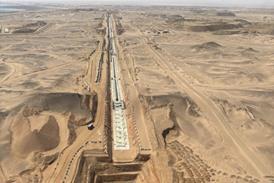RIBA research also shows practices’ confidence lowest for three years
More than half of architecture practices have made no preparations at all for a no-deal Brexit, according to new RIBA research.
Some 57% of firms have made no plans of any sort – and only 5% of them are intending to do so.
A further third say they have done very little planning, according to the findings of the RIBA’s latest monthly Future Trends survey.
Only 7% claim to have made preparations across all areas where disruption is expected, despite government advice to prepare for Britain’s potential departure from the EU without a deal.
The survey also returned a depressing picture of architects’ confidence, with the workload index for September dropping to its lowest level for three years.
It is the fourth time this index, which predicts future workloads, has fallen into negative territory since 2013.
Practices in London and the south of England continued to be the most pessimistic about future workloads, with London dropping 7 points to -15 and the south of England returning a figure of -8. Workload predictions in the north of England dropped significantly from +29 to +6. And confidence in the Midlands and East Anglia also fell. Wales and the west were the only regions where sentiment improved, rising from -15 to 0.
Confidence in small practices (10 staff or fewer) dropped deeper into negative territory. Larger practices were more positive.
The wobble hit all sectors, even the private housing sector which was last negative as long ago as 2012.
However, the Future Trends staffing index rose from 0 to +3 in September, suggesting practices still intend to recruit in the next three months.
RIBA’s head of economic research and analysis, Adrian Malleson, said: “Every month we collect commentary from our survey’s participating practices. In September, many were unequivocal that Brexit has brought significant difficulties to current architectural practice. These range from a reduction in small private housing work and fewer enquiries, to wider concerns about the supply of materials and labour in the case of a no-deal Brexit.”
RIBA president Alan Jones added: “Continued political and economic uncertainty has put architects in a state of limbo, making it very difficult for practices to plan for the future. The RIBA has been providing resources to help guide and support members through these turbulent times, but it is clear the UK needs urgent clarity on Brexit, and how it will affect access to talent, the ability to trade and its impact on development.”
















4 Readers' comments